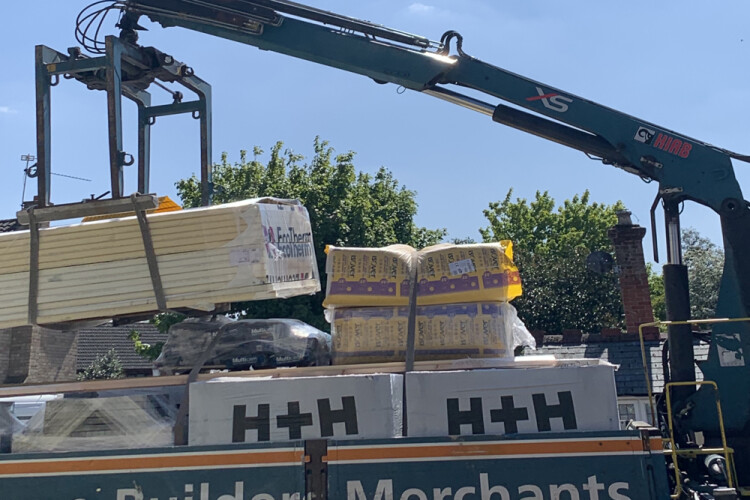Latest warning from industry leaders is that “high demand coupled with tight supply will sustain elevated prices throughout the year".
The problem is particularly accute with imports, which is due partly to Covid, partly to the UK no longer being part of the European Union and partly to global demand.
It all contributes to the growing prospect of inflation facing the UK economy.
The Construction Leadership Council’s product availability working group has been tracking product shortages and the problems created.
John Newcomb, chief executive of the Builders Merchants Federation and Peter Caplehorn, chief executive of the Construction Products Association, co-chair the group and have issued their update for June.
“The overall product availability picture has not changed this month. Demand both in the UK and globally continues to dramatically outstrip supply and shows few signs of slowing during the seasonally busy summer months,” they said.
“In the UK, record sales of building materials coupled with strong pre-orders and full pipelines of work are all putting enormous pressure on the supply chain which, in some sectors, has not fully recovered from the impact of Covid. This suggests the unprecedented challenges around a number of key product areas, particularly imported products and materials, will likely persist into the second half of 2021.
“Timber, roof tiles and some steel products continue to be in short supply, as is bagged cement which may have been impacted by some manufacturers undertaking overdue preventative maintenance. Paints, sealants and chemical products, continue to be affected by raw material shortages, with paints additionally affected by a shortage of packaging, particularly metal cans. The situation with insulation boards has also become tighter, with PIR becoming harder to obtain and contractors actively seeking alternatives. Plasterboard has been subject to extended lead times with one major manufacturer indicating their products going on allocation.Some regions are also reporting delayed deliveries of bricks and blocks.

“Electrical products have been affected by raw material shortages, particularly steel products and semi-conductors, since autumn 2020.These issues are now compounded by the shipping backlog in China’s Pearl River Delta, with hundreds of container ships waiting for berths to become available. The Electrical Contractors Association and their Scottish counterpart, Select, are warning that the blockage already surpasses that of the Suez Canal earlier this year and is likely to lead to extended delays for electro-technical products.
“The availability of hauliers is a particular issue raised within the group over the past months and it is clear that this is now a critical nationwide problem causing delays and impacting project programmes.The UK has lost 15,000 European drivers this year due to Brexit, and 30,000 UK driver tests due to Covid, which has exacerbated the driver shortage.The CLC’s product availability group is supporting the Road Haulage Association in its discussions with the Department for Transport to address the shortage.
“Inevitably, all of this is feeding into price inflation, and the expectation is that high demand coupled with tight supply will sustain elevated prices throughout the year.”
The warning from the Construction Leadership Council follows a statement by the Timber Trade Federation (TTF) three weeks ago that the balance between supply and demand for timber is likely to further tighten in the third quarter of 2021. Despite strict allocations, most buyers are already unable to purchase all the timber they want for their business, the federation said.
“As we enter July, sawmills and wood production facilities in Sweden and other European countries start to close for essential summer maintenance, and this will significantly reduce the available supply of structural wood for the UK,” said TTF technical and trade manager Nick Boulton. “Usually during the summer shutdown period there is a significant reliance on Swedish sawmill stocks. However, if these stocks are now at their lowest level for 20 years there will not be sufficient supply to satisfy UK structural wood demand in Q3.
“Although prices have risen substantially from an artificially-low point towards the end of 2019, they have now exceeded the levels of 2018, and are set to increase further as the current supply situation significantly worsens.”
Last month British Steel announced that it had temporarily stopped taking orders for structural steel sections while cement producer Hanson said that it was unable to meet demand for bagged cement and was reducing allocations that it had only recently introduced.
While small builders are reported to be bearing the brunt of the shortages, big contractors are also worried. Willmott Dixon chief executive Rick Willmott said on 28th May: “We are concerned for the industry because of the medium-term impact of Covid-19 on the global supply of materials. Spiralling demand and restricted supply could create a number of immediate pressures in our sector, including: rampant cost inflation in a generally fixed price environment will quickly erode supply chain margin; unavailability of materials will delay project completions; capital projects may no longer be financially viable leading to a hiatus in contract awards.”
Got a story? Email news@theconstructionindex.co.uk


.gif)
